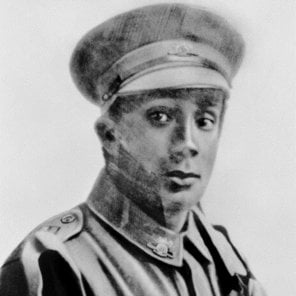
- Inducted:
- 2014
William Reginald Rawlings — known to his family today as Uncle Reggie — was a courageous Aboriginal soldier who was awarded the Military Medal for his bravery in battle during World War I. He was sadly killed in France just 3 months out from the end of the war, on 9 August 1918.
Early years
Born at Framlingham Aboriginal Reserve, near Purnim in western Victoria, the exact year of William's birth is unknown. Most records put it at around 1890–91. He was the son of William Rawlings and Elizabeth Mary (née Gorrie) and had 1 sister. William is thought to have attended the local state school and came from an athletic family — his father was a runner who competed in the Stawell Gift.
William's family spent many years fighting to remain on Framlingham. When the Board for the Protection of Aborigines attempted to relocate them around 1890, they joined others in refusing to leave. Excepting a period between 1898 and 1900, when the family was removed to the Lake Condah Aboriginal station, Framlingham always remained their home.
Awarded the Military Medal
On 14 March 1916, William enlisted in Warrnambool as a private in the Australian Imperial Force. His occupation was recorded as horse breaker and his age as 25 and 3 months. William embarked from Melbourne in August 1916 with the 8th Reinforcements to the 29th Battalion and arrived in France in November. Within his first year he was evacuated to England to recover from trench foot, a potentially debilitating medical condition affecting soldiers' feet, caused by damp and unsanitary conditions experienced in trench warfare. He rejoined his unit in late 1917 and went on to distinguish himself as a soldier.
William was awarded the Military Medal for his role in a successful advance made by the 29th and 32nd Battalions on Morlancourt Ridge in July 1918. In the position of first bayonet man in the bombing team, he led an attack on a communication trench during which he ""brushed aside all opposition"". The military citation read that he displayed ""rare bravery"" and set a wonderful example to his team with ""his irresistible dash and courage"".
The local community paid tribute to his bravery
On 9 August 1918, the 29th Battalion participated in the capture of Vauvillers. As William left the trench and started the advance he was hit by a shell and killed instantly. He was buried at Heath cemetery in Harbonnières, France. Back home, the local community paid tribute to his bravery, with the Warrnambool branch of the Returned Services League (RSL) describing him as ""a fine soldier"".
Today, William is remembered by his descendants for having paid the ultimate price in the defence of freedom. His story also serves to remind us of the contribution made by hundreds of Aboriginal service men and women during the war years.
Lest we forget.
Updated

